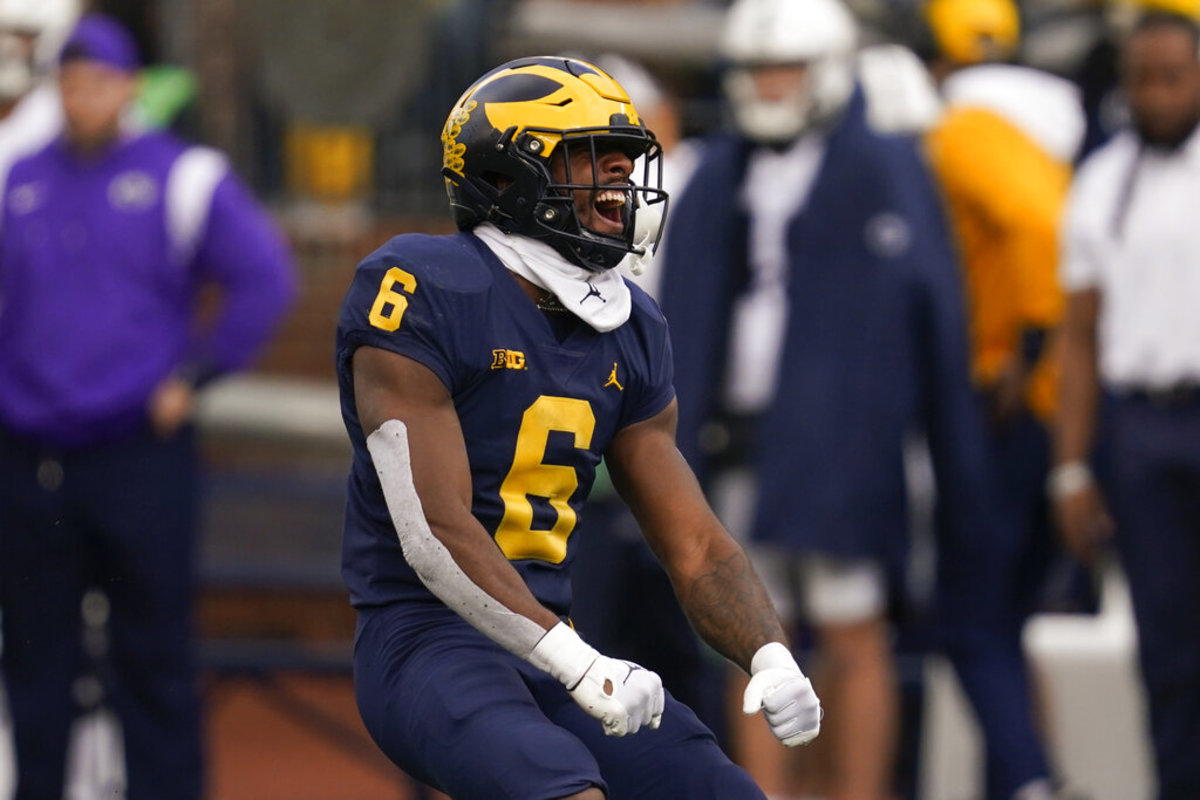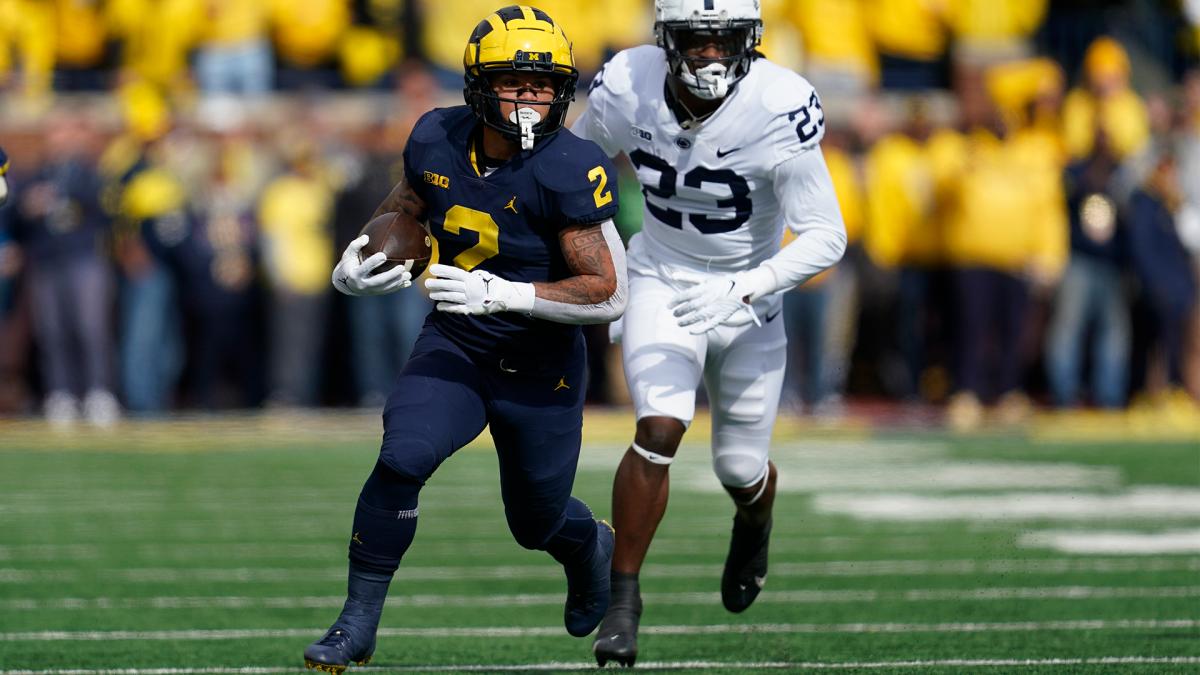Michigan's Rout of Penn State Reinforces Big Ten's Pecking Order

ANN ARBOR — Michigan so thoroughly dominated Penn State on Saturday that by the end of the third quarter, even the Nittany Lions were looking forward to Michigan-Ohio State. This was hammer hitting thumb for 60 minutes, a beatdown so thorough that the final score of 41-17 doesn’t quite capture it.
Michigan ran 55 times for 418 yards, never punted and never turned the ball over on downs. Total yardage on the day: Michigan 563, Penn State 268. Penn State did not gain a first down until there was 7:51 left in the second quarter—and had just 10 first downs all day. This was such an obliteration that even though Michigan only led 16-14 at halftime—thanks to a tipped pass that led to a pick-six and one long Penn State run—the outcome still felt inevitable.

“We did not control the line of scrimmage on either side of the ball,” Penn State coach James Franklin said. “Although the score at the end of the first half, we were in the thing, we did not control the line of scrimmage.”
New year, same old story in the Big Ten: Ohio State and Michigan are the class of the conference again. Last year, the Wolverines finally broke through against the Buckeyes and made the College Football Playoff. When Michigan coach Jim Harbaugh chose dynamic sophomore J.J. McCarthy as his quarterback over steady vet Cade McNamara in September, it was easy to see Michigan has a higher ceiling than last year. It is now clear that Michigan has a higher floor, too.
The offensive line might be better than last year’s. Tailbacks Blake Corum and Donovan Edwards are burners, but not just burners; rare is the speed back who runs with as much toughness as Corum does. McCarthy is not yet a great quarterback, but he makes enough great plays to inspire confidence that he will get there. In the meantime, Michigan’s offensive and defensive lines should overpower everybody they see until they head to Columbus in late November. Penn State had two weeks to get ready for this and ran into two walls.
“Eleven guys out there at a time setting the tone for 60 minutes,” Harbaugh said. “It was very impressive.”
Before Saturday, there were legitimate questions about Michigan’s strength of schedule. Michigan defensive end Mike Morris defended the schedule Saturday, saying “I think anybody in the Big Ten can beat anybody in the country,” but from what we just saw, anybody in the Big Ten cannot even beat anybody in the Big Ten. Penn State is probably the third-best team in the conference, but it’s a distant third.

Michigan is off next week, then plays a revenge rivalry game at home against a struggling Michigan State team. The Wolverines are more likely to win that game by five touchdowns than lose it. After that, they play Rutgers, which just fired its offensive coordinator; Nebraska, which just fired its head coach; and Illinois, which, for the first time in decades, is actually not looking to fire anybody. Maybe Bret Bielema’s Illini will shock Michigan, but that is unlikely. That will be power football against power football, and the Wolverines will have a considerable talent advantage.
Every college football game is really two games at once: The one reflected on the scoreboard, and the one in public perception. Michigan has firmly shut down any notion that Harbaugh’s flirtation with the NFL would affect the program. Penn State, meanwhile, has questions it can’t answer. Franklin both gave Michigan credit and said his team didn’t play well, but this wasn’t a matter of execution. Line these teams up 10 times, and how many does Penn State win? One? Two?
“We got to develop, we got to recruit, we got to get bigger,” Franklin said. “We're undersized in some spots. Everybody thinks they're Aaron Donald now and they're not … everybody sees Aaron Donald play undersized. And everybody thinks they're that guy. And there's been one of those guys in the last 100 years.”
This was a strange comment. Franklin is in his ninth year at Penn State. He built the team. Did his recruits fool him with Photoshop? Didn’t he know how big they were when he signed them?
We will see if Franklin was telegraphing some sort of change in his program or if he was just speaking out of frustration. But the hard reality for the Nittany Lions is that they have not contended since 2019. They’re good. They could win 10 games. But for the second straight year, they are also clearly not in the class of Ohio State and Michigan.
It is too early for Michigan to look ahead to the Buckeyes, but that’s the beauty of a Harbaugh program: His teams never look ahead. The time management isn’t always perfect. The play-calling can seem borne of stubbornness. For a while, there was too much turnover on the coaching staff, and that had to affect recruiting. But from Stanford to the 49ers to Michigan, Harbaugh has gotten his teams to show up and play hard. He does that as well as anybody in the country.
After a few fits and starts, Harbaugh has Michigan right where most people predicted when he took over in 2015. Morris said his team is “stacking and stacking and stacking”—one practice, one game, one season after another. Destroying the No. 10 team in the country is supposed to be a big deal. For Michigan, it felt like just another day.
